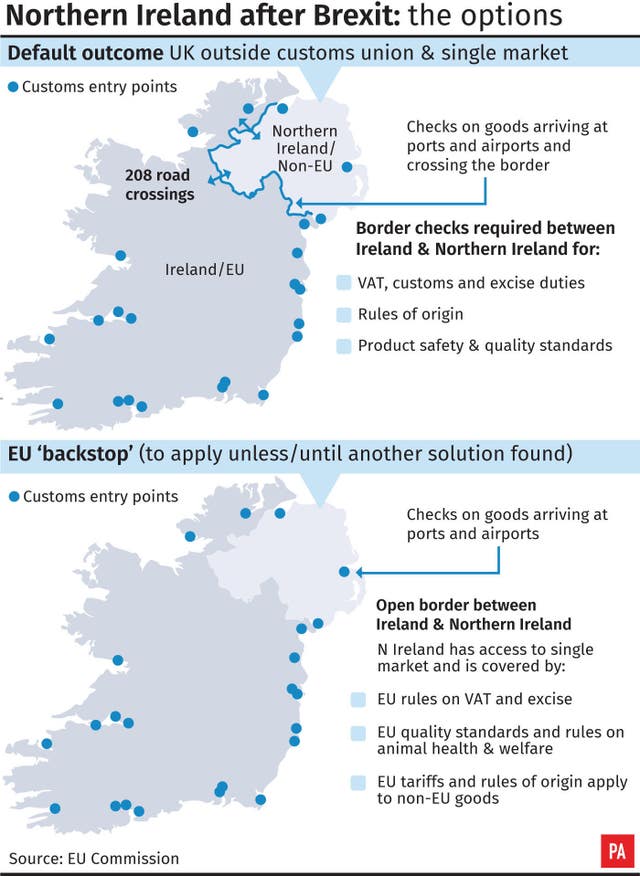Downing Street dismisses reports of separate backstop deal with Ireland
Theresa May is due to set out her next steps on Brexit in a statement to the House of Commons.

Downing Street has dismissed reports that Theresa May is considering rewriting the Good Friday Agreement or seeking a separate deal with Dublin in order to break the Brexit deadlock over the so-called “backstop”.
Mrs May is due to come back to the Commons to spell out her next steps to build a Commons majority for a Brexit deal, amid signs she is still unwilling to give ground on her central demands.
Following the crushing defeat last week of her agreement with Brussels, the Prime Minister will make oral and written statements to the House explaining how she intends to proceed.
And her official spokesman made clear that she is focusing on the possibility of changes to the backstop mechanism, designed to ensure there is no hard border between Northern Ireland and the Republic if a broader trade deal cannot be agreed.
“It’s clear already that a significant number of colleagues have expressed concerns around the backstop,” said the spokesman. “That’s one of the areas that we are going to be looking at.”
Following the defeat of Mrs May’s Withdrawal Agreement by 230 votes last week, he said, “it is clear that if we are going to get Parliament to support the deal, we are going to have to come forward with something that is different”.
Asked whether the PM was considering changes to the 1998 Good Friday Agreement, which brought an end to the Troubles in Northern Ireland, the spokesman said: “No. The Prime Minister has been clear on multiple occasions that we are committed to upholding the Good Friday Agreement in all its parts and to delivering a solution that avoids a hard border between Northern Ireland and Ireland.”
On the prospect of a bilateral agreement with the Republic of Ireland, the PM’s spokesman said: “It’s not something we are looking at.”
European Parliament vice-president Mairead McGuinness, an MEP for Taoiseach Leo Varadkar’s Fine Gael party, said a new treaty between the UK and Ireland to replace the backstop was “not an option”.
And the EU’s chief negotiator Michel Barnier, who held talks with Irish foreign minister Simon Coveney in Brussels, ruled out the prospect of a separate deal between London and Dublin, telling RTE: “As you know … we are working 27 as a team, a single team and we negotiate as one.”
Poland’s foreign minister Jacek Czaputowicz suggested the deadlock could be broken by setting a five-year time limit on the backstop.
He told Polish newspaper Rzeczpospolita: “If Ireland asked the EU to amend the agreement with the British on the backstop so that it would apply temporarily – let’s say five years – the matter would be solved.
“It would obviously be less favourable for Ireland than an indefinite backstop, but much more advantageous than no-deal Brexit.”
Mr Czaputowicz said that London and Dublin were “playing chicken” over the border and risked a “head-on collision” in which Ireland stood to “lose the most”.
A senior member of Angela Merkel’s Government, industry minister Peter Altmaier, warned against trying the EU’s patience for political reasons.
“Sympathy, patience and readiness to wait until the UK’s position will be clarified are of utmost important to avoid the worst,” warned Mr Altmaier.
“They should not be misused for party politics. Large majority wants to exclude hard Brexit – in the interest of the UK and beyond.”

And the European Commission made clear that Brussels believes the ball is now in London’s court on Brexit. A spokesman told reporters: “Don’t look for answers from Brussels. Now is the moment for London to speak, not for us.”
Mrs May is set to table a “neutral” motion to be debated and voted on – along with any amendments tabled by MPs – on January 29. Neutral motions are usually unamendable, but in this instance MPs will be able to express an alternative to the Government’s plan.
Government sources said she would be holding further talks with MPs, as well as business leaders and trade unionists, throughout the week in an attempt to find a way forward.
Chuka Umunna, Chris Leslie, Gavin Shuker and Luciana Berger defied Jeremy Corbyn’s plea for the party’s MPs to boycott the talks, as they joined Tory backers of a second referendum including Anna Soubry, Heidi Allen and Sarah Wollaston in discussions with Mrs May’s effective deputy David Lidington.
There was anger among pro-Leave MPs at moves to enable backbenchers to take control of the Commons business from the Government – in breach of normal conventions – through a series of amendments to the neutral motion.
One group, including senior Labour MP Yvette Cooper and Tory former minister Nick Boles, is seeking to give time for a Bill to suspend the Article 50 withdrawal process if there is no new deal with Brussels by the end of February.
Ms Cooper told BBC Radio 4’s Today programme that she believed the Prime Minister was hoping Parliament would rule out no-deal on her behalf.
She said: “I think she (Mrs May) knows that she should rule out no-deal in the national interest because it would be so damaging. She’s refusing to do so and I think she’s hoping that Parliament will do this for her – that is not leadership.”

It came as Business Minister Richard Harrington warned that crashing out of the EU without a deal would be an “absolute disaster” as he urged Mrs May to rule out a no-deal Brexit.
Mr Harrington told Today he was “afraid” of car-makers Jaguar and Mini closing if there was a no-deal Brexit.
“Crashing out, in my view … is an absolute disaster,” he said. “It’s not a road to a free trade agreement, it’s not a road to anything. It’s an absolute disaster for the country and it’s supported by a minority of a minority of people.”
Another more radical amendment drawn up by former attorney general Dominic Grieve would allow a motion by a minority of 300 MPs – from at least five parties and including 10 Tories – to be debated as the first item of Commons business the next day.
Mr Grieve said it would enable the Commons to stage a series of “indicative votes” on the various alternatives, such as a “soft” Norway-style deal or a second referendum to establish which could command a majority.
Meanwhile, Sir Stephen Laws, a senior research fellow at the Policy Exchange and a former Government law chief, said MPs seeking to delay or stop Brexit could risk involving the Queen.
Shadow foreign secretary Emily Thornberry suggested Labour might not back a second referendum unless the UK is “about to hit the wall of no-deal”.
She told the BBC’s Victoria Derbyshire show that there were “other things that also need to be done”, saying: “If we have got to the end of January and we still haven’t got anything that is the slightest bit agreed they really will need to start thinking about extending Article 50, won’t they?”
She added: “If we end up where we are absolutely about to hit the wall of no-deal then of course we will try anything we can to make sure that we protect our country.”





